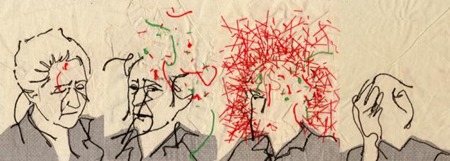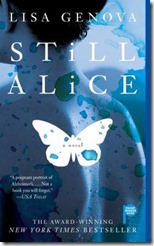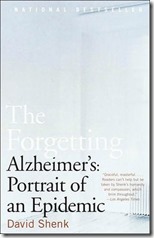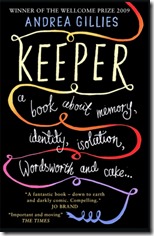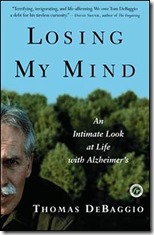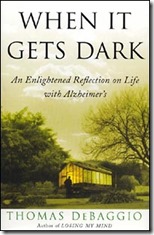Alzheimer’s is the cleverest thief, because she not only steals from you, but she steals the very thing you need to remember what’s been stolen ― Jarod Kintz, This Book Has No Title
‘Journey into Alzheimer’s’ by Ruth Blackford
To the best of my knowledge I don’t have Alzheimer’s although, if what I’ve read is anything to go by, none of us can say nay with any degree of certainty because it takes a while for any symptoms to manifest and even then the only way to know for sure is to cut your head open and look to see if there are any tangles and plaques in there. I do have difficulty remembering stuff. I’m in my fifties and most people my age will have started to notice that their brains aren’t quite as sharp as they once were. If I was to look on the bleak side I might be tempted to think I was suffering from mild cognitive impairment (MCI) but since there’s no way to test for it conclusively, either, I’m not desperate to label what I have. But I do forget things quickly. If ‘forget’ is the right word and I’m not sure it is. There’s a negative connotation to forgetting. I don’t so much forget as let go of stuff once I’m done with it. I couldn’t tell you my daughter’s address or my wife’s mobile number. I know where to find both of them so I don’t need to remember them but it still puzzles me that I can’t remember them.
My ‘bad’ memory is nothing new. I’ve always had a ‘bad’ memory. For certain things. I was talking to my wife about this a wee while back—and I can remember talking to my wife so I clearly don’t forget everything. I was telling her about a boy I went to school with, Neil McC. We were in Primary One together and we left secondary school on the same day so I knew him for eleven years. We were friends, good friends for a while, but this is all I can remember about him apart from his looks: he was born on May 15th (the same date as my kid brother which is the only reason that stuck); he was into Genesis (while Gabriel was still in the band—I can picture him showing me The Lamb Lies Down on Broadwayin his bedroom) and Wishbone Ash; he lived on the ninth floor of the first block of flats you reached walking into town; he was with me when we found the fossilised ‘brain’ in the mud on the way to school (it was actually a sponge); he emigrated to Australia and his mother—who was a thin, tall, very polite woman—moved after that to a flat above the corner shop. And that’s it. Eleven years and that’s it. I couldn’t tell you if he was in the football team or the rugby team. I don’t know what subjects he took. I’ve no idea if he ever had a girlfriend at school although I don’t think so; very few of us had proper girlfriends at school.
Clearly I knew much more about him over the years but I’ve not felt attached to those things and I’ve let them go.
The subject of memory loss fascinates me though. There are things I wish I could remember more about and feel a real sense of loss over. I feel I’ve been negligent, not taken care of my memories. And that’s the thing when we’re kids, we can’t imagine getting old, losing our hair, our teeth, our figures, our memories; we’re cocky, we eat what we like, drink what we like, stay up as late as we like and never imagine there’ll be any consequences and then we hit fifty and find we have to watch our salt and sugar and fat and wheat and caffeine and milk—seriously, why did eating get so complicated? Use it or you’ll lose it, so they say. I neglected my memories and they faded away. Now I need memory aids to crack open the doors. If this flat burned to the ground and I was just me how much would be lost forever I wonder?
So I’ve been reading a lot about Alzheimer’s recently. I’m calling it research. I’ve been trying to write about memories for a while now—unsuccessfully I should add—and I was hoping one or more of these books might give me an in or an angle or something. So this isn’t a proper review, just a few observations. I chose five books originally and then ordered a sixth. There’s a lot of stuff out there directly (quite rightly) at carers: it’s a soul-destroying job having to look after a loved one with dementia and they need all the pointers and support they can get. I was more interested in what sufferers had to say.
This was a New York Times bestseller. I tend to shy away from bestsellers but I was pleased enough with the purchase. This is a novel and a very well-researched one at that. It focuses wisely on the early and middle stages and all credit to the author because the world she presents is realistic and believable. There’s not a great deal of plot and certainly no subplots. We simply follow this woman as she not-nearly-as-slowly-as-she-would-have-liked slips away. It can’t help but be tragic but the author doesn’t milk it although it does feel a little contrived at times: you know when the woman, Alice, describes the process of eating ice cream at the start of the book there’ll be a scene towards the end where she makes a mess of it; you know when she has a sister who died called Anne and a daughter called Anna they’re going to get mixed up in her head. The most heart-breaking thing is when Alice’s Blackberry, which she’s carried around with her as an extension to her memory, gets damaged; you can’t see the damage to her brain but you can see the damage to her phone. We know right from the start what the future holds for Alice. It doesn’t matter that she’s a plucky individual who’s not going to lie down to this easily because she’s got no choice; this was never going to be a fair fight.
If you know nothing about Alzheimer’s and want a quick overview then this is as good a place as any to start which is why I did; it was an easy read and far more enjoyable than a textbook with a title like Introduction to Alzheimer’s Disease. Shame it was written in the third person.
The Forgetting: Alzheimer's: Portrait of an Epidemic by David Shenk
This is an extremely well-constructed and well-written book. It treads the line between history book and memoir carefully but with something of the novelist’s panache. It should probably get labelled ‘Popular Science’ as it’s really not a textbook in the proper sense. There are several strands to this book which could have been presented as chapters in their own right but the constant interweaving of these stories—the history of Alzheimer’s from its initial discovery to now, the course of the disease, the life of Emerson, a conference in 1999—is beautifully done. It’s also a surprisingly frank book. It’s honest about the disease, yes, as you would expect, but it is also honest about those looking for a cure and the politics involved, who gets the grants and why and in that respect it shows up the major flaws in scientific research at the end of the twentieth century (the book came out in 2001) but there’s no reason to assume that things have changed much in the interim. Of course the book isn’t as up-to-date as it could be and there have been new discoveries since it was written but it is still well worth reading for its humanity. More than anything else I’ve read this author manages to put Alzheimer’s in perspective. It’s easy to get caught up in the tragedy of it and not look properly at it. The book also discusses some frankly philosophical issues like the nature of memory and the fact that virtually all our memories are actually memories of memories: the things that get remembered are the things that get remembered. Loads of interesting anecdotes along the way. The one that jumped out at me was the debate that raged in the artistic community about the worthiness of the paintings de Kooning made after he was diagnosed with Alzheimer’s. Somehow his art—which was getting a little stale at this point—was granted a second wind, the last thing one would’ve expected. If the book is a little weak it’s on personal accounts—these tend to be relegated to quotes in-between chapters—but this is a minor gripe; there’re other books out there to fill that gap and I’ll come to them. Another valid ‘criticism’ I suppose is that the book is very American in its perspective. The writer drew on what was familiar to him. There are no doubt plenty of examples out there on the other continents that he could’ve used but it didn’t bother me.
Keeper: One House, Three Generations, and a Journey into Alzheimer's by Andrea Gillies
This book upset me. The first two books didn’t upset me but this one did. The first two were good but I read them dispassionately. Keeper, on the other hand, got to me and it’s all credit to the author’s brutal honesty, not only about her mother-in-law’s condition and… I’m going to use the word ‘antics’ but it’s really far too jolly a word for what Nancy gets up to. Reading about how the disease affects people in a textbook is one thing but hearing someone describe the painfully slow decline of a loved one is something else. Have you ever watched a time-lapse film showing a piece of fruit decay? Well, that’s what this book was like. Months and months of a mind seizing up reduced to a couple of hundred pages. The tendency when faced with the ravages of extreme age is to look away. The author acknowledges this and tries to understand it; we all do it so it must be natural but to what end? And yet we’re not so squeamish when it comes to car crashes. Funny things us humans and by ‘funny’ I mean perverse. Normally we reign in that perversity but when we lose control it all spills out. Alzheimer’s is a very personal disease—no two cases will follow the same pattern—but it’s possible to outline the basic course of the disease and the author does slip in a fair amount about the nature and history of the disease and the progress that’s being made in treating it all of which is covered better elsewhere but that’s not what this book is all about. This book takes statistics and symptoms and charts and tables, gives them a name, a face, a past, a family and a personality, lights the blue touch paper and steps well back. If you’re only going to read one book on the subject then this wouldn’t be a bad choice. It was also nice that they were based in the UK and could talk about the problems they had with local councils and the NHS which despite being a national treasure is far from perfect.
Losing My Mind: An Intimate Look at Life with Alzheimer's by Thomas DeBaggio
Thomas DeBaggio was diagnosed with early onset Alzheimer’s in 1997; he was 57. He died in 2011. He wrote two books talking about his condition, Losing my Mind, published in 2002 and When it gets Dark published a year later. This was the first book about Alzheimer’s written by an actual sufferer; the novel I read was written from the perspective of a sufferer but the author didn’t have the disease and so it was a more polished and structured book than this, although not a bad book and clearly, as I’ve already said, well-researched. This book is the real deal and a much harder read. It’s not a hard read in the sense of it being an upsetting book; it focuses on his experiences whilst in the early stages of the disease and it’s only in the last few pages where, for example, he calls for his mother at night after having a nightmare that you see what the future’s going to be like and there’re other books that describe that vividly, albeit from a carer’s point of view. No, this is a book describing a man coming to terms with losing himself. What makes it a hard read is that he’s chosen to write the book in a style that emulates how his mind is working/not working. There is a rough chronology to the work but his jumps about from here to there and so it takes a while before you start to build up a picture of this man and his life. He’s not lived the most exciting of lives but his time as a journalist during the sixties and seventies was interesting. He inserts quotes from journals to explain the factual elements but strangely enough chose a lot of things that didn’t rehash what I’d read elsewhere and I was grateful for that. Some of the entries are just one or two lines long, things like “There is death working away in my body. I live there in the company of fears,” “What am I doing here?” and, for me the most powerful quote in the whole book, “Alzheimer’s has taught me that sometimes it is wise to look in the same place many times for the things you desire.” Pages and pages of these could quickly become maudlin but there are just enough of them and their brevity and poignancy jump out at you.
The author has made a real effort to be open and honest. That you’re left at the end of the book wondering about many of the things he’s mentioned is probably the nearest he was ever going to get to communicating how he must feel; the arbitrariness of the disease’s course definitely comes across.
Iris: A Memoir of Iris Murdoch by John Bayley
Having seen the film adaptation, albeit a while ago, I was surprised to find I enjoyed this book as much as I did. Bayley has a nice conversational style and this is very much a memoir and not a biography although, of course, the book is full of biographical details. It is also a far from objective assessment of his wife and her achievements; he’s happy to leave others to do that. No, this is a record of a flawed man’s love for a flawed woman. His love, though, was not flawed and it was certainly not blinkered (from the very start he was well aware of her limitations) but it was total; he was devoted to her from the beginning. So if you’re looking to learn more about Iris Murdoch’s body of work or wanting to learn more about Alzheimer’s this really isn’t the book for you and it never pretends to be, in fact, as regards her dementia, in a single sentence he skips a whole eighteen months of the disease which I thought was a lost opportunity. Although the book is called Iris it could just as easily—more so in fact—have been called John because he really is the central figure here; this is his story even more than it’s his wife’s and so I suppose that might be another reason for it to disappoint, but all of it comes down to the expectation of the reader as opposed to the intention of the author. I’ve no doubt that he achieved what he set out to do and was pleased with the results. Oh, and I know my edition was promoting the film but did we really need a photo of Judi Dench on the cover; a subtitle ‘Now a major motion picture starring Judi Dench’ would’ve been quite sufficient.
When It Gets Dark: An Enlightened Reflection on Life with Alzheimer's by Thomas DeBaggio
Having got a lot out of his first book I decided to order this one. I read the two books in the order in which they were written and because of this I find myself biased in favour of the first book but mainly because I read it first. The books cover the same ground. Both are in fact autobiographies but not of anyone especially famous—unless you’re into herbs, then DeBaggio’s name is well known—but of an ordinary, decent bloke who just happened to get some bad news from his doctor one day.
DeBaggio’s life is actually quite interesting—he grew up in interesting times—and as such listening to him talk about his life and his deaf cat isn’t unpleasant, although having no interest in gardening whatsoever, the long passages talking about the joy of dirt didn’t do much for me. Where his first book is “better” than this one is in its structure. In When it Gets Dark he utilises a chronological structure and so he doesn’t really get into the affect Alzheimer’s has on his life until about a hundred and fifty pages in, which is fine unless you’ve read the first book and keep remembering bits and bobs. The first book doesn’t follow a chronological structure and so it takes one longer to get to know the guy behind the words but it also presents—this was his intention—a more realistic impression of what a life with Alzheimer’s is like, at least in the early stages. It’s a harder read but a better one.
In both books he inserts his day-to-day thoughts into the flow of the text, little aphoristic statements, observations, poetical notes. What comes clear quite quickly is that the language with which he has to communicate his losses is rather clichéd: fading, crumbling, slipping. This is not his fault. Go to any funeral and you’ll see the same happen. People don’t know what to say and so they fall back on well-worn expressions: I’m sorry for your loss, He was a good man, He’s in a better place now.
That said DeBaggio does his damndest to present a brutally honest picture of his mental state despite the fact his text has had all the typos fixed and that does mask the effort that must’ve gone into this work; an appendix with an uncorrected page would’ve been appropriate. Although written later than the first book this second one doesn’t reveal a great deal more; he hasn’t moved on that far. I would recommend buying Losing my Mind rather than this one and certainly not both.
There’s not one single book in the list that covers everything. If you are looking to learn more about Alzheimer’s I’d recommend these three:
- The Forgetting: Alzheimer's: Portrait of an Epidemic
- Losing My Mind: An Intimate Look at Life with Alzheimer's
- Keeper: One House, Three Generations, and a Journey into Alzheimer's
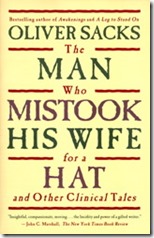 I bought all three for pennies on Amazon.co.uk. I’m not sure how useful they’re going to be in my writing but we’ll have to see what sticks and what my subconscious can make use of. While I was waiting on the second DeBaggio book coming I also read The Man Who Mistook His Wife for a Hat and Other Clinical Talesby Oliver Sacks. The book underlined just how little we still know about the human brain and how it works. What’s clear is that it doesn’t lie down without putting up a fight.
I bought all three for pennies on Amazon.co.uk. I’m not sure how useful they’re going to be in my writing but we’ll have to see what sticks and what my subconscious can make use of. While I was waiting on the second DeBaggio book coming I also read The Man Who Mistook His Wife for a Hat and Other Clinical Talesby Oliver Sacks. The book underlined just how little we still know about the human brain and how it works. What’s clear is that it doesn’t lie down without putting up a fight.
I’ve very little experience of dementia. My mother was a wee bit doty towards the end and it might’ve been the early signs of dementia but she died of pneumonia before we had to worry about that. Carrie’s mother in the States is in the middle stages but I’ve not seen her since she got bad and so most of what I hear is second-hand. The only thing I’ve written on the subject is this short poem from 1983. I was taken to visit an old woman who’d just been admitted into a nursing home and whose short-term was shot. It was a terribly upsetting visit and despite the fact it’s been thirty years since I was there the experience has stayed with me. The old woman kept searching for her keys in her purse so she could go home. We’d explain to her that the nurses had them and why she’d been admitted and she’d calm down and then a few seconds later the memory of what we’d just said would slip away—you could literally see the awareness vanish from her face—and she’d begin her pointless task again. We were there for maybe an hour in which the same five minutes was replayed over and over again. Heart-breaking.
THE VISIT
Sympathy and Apathy
sat side by side in
the old folks' home,
neither knowing what
they were doing there.
Not really.
(For Elizabeth Gray (91))
4 September 1983
